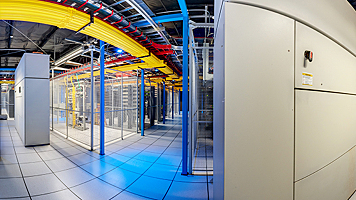
Cloud computing can be summarized as an IT infrastructure that facilitates a unique blend of Internet services, i.e. private, public, hybrid and multi-clouds which encompass Infrastructure-as-a-Service (IaaS), Software-as-a-Service (SaaS) and Platform-as-a-Service.
What was the origin of cloud computing?
It’s widely believed that an American computer scientist (J.C.R. Licklider) helped create the Advanced Research Projects Agency Network in 1969, the so-called precursor to the Internet (the cloud).
In the 1970s, the term cloud computing began popping up in infrastructure discussions with the introduction of the first virtual machines. The functionality of these VMs led to the concept of virtualization.
Virtualization depends on software to simulate hardware functionality, creating a virtual machine. The resulting benefits include economy of scale and greater efficiency.
Why is cloud computing used versus VPS or dedicated servers?
Cloud computing makes business continuity more efficient because data can be mirrored at multiple redundant sites on the cloud provider’s network. The term “cloud” is simply a metaphor for the Internet depicting an abstraction of its underlying infrastructure.
Is cloud computing secure?
Security is a prominent issue for organizations contemplating adapting the cloud, especially public clouds. This means that there must be significant isolation between them. To remedy this, access to public cloud storage and its resources is isolated by account login credentials.
A good number of companies are bound by government regulations. Industry wide, there was an initial hesitation to place data in the public cloud for fear of theft or loss. This hesitation has faded over the years as data encryption and various identity and access management tools have improved security.
Here again, I highly recommend implementing a disaster recovery solution, either cold, warm or hot, as your mission critical data is your responsibility. Way too many companies lose their data for any number of unforeseen issues and ultimately lose their business. It’s always better to be proactive rather than reactive.
What are some of the benefits of cloud computing at a data center
- Cost reduction.Certainly, setting up an internal IT network gets pricey really quick. First up, you’d need redundant Internet feeds to your building, and then another huge capital expenditure for servers, routers and switches, plus all of the necessary software. Add on IT personnel working in shifts. Have you researched the expected salaries for sysadmins lately? And then you have to deal with sick time, vacations and benefits like health insurance and on and on. Having cloud infrastructure at a data center eliminates much of that expense.
- Cloud computing also reduces downtime since this hardly ever occurs. Downtime can result in thousands or even millions of dollars lost in revenue or productivity. How would two hours or weeks of downtime affect your business or organization?
- For companies that have very seasonal products or services, like during the Christmas holidays, cloud services are ideal. Cloud computing is highly scalable, unlike VPS or dedicated server services. This eliminates the expenditure for local infrastructure.
What are some of the disadvantages of cloud computing?
- Lack of expertise. Let’s face it, cloud computing technologies have greatly evolved over the years and continues to do so. Hiring employees with the proper skill sets and knowledge to keep pace with today’s architectures can be overwhelming.
- Cost control. When you’re leasing a VPS or dedicated server, costs are fixed, but with a cloud solution, costs are variable. For example, when you lease a dedicated server, you typically get a specific CPU, an exact amount of RAM and storage, and some sort of bandwidth allowance for a fixed price. The scalability of the cloud, while beneficial to some, does add a variable to the mix.
A cloud solution is not for everyone, and if not properly managed can result in a colossal mess. Of course, you can say the same for other technologies. We’re just saying look before you leap.
BROUGHT TO YOU BY PROLIMEHOST
We’ve been in the web hosting industry for over a decade, helping hundreds of clients succeed in what they do best and that’s running their business. We specialize in Virtual Private Servers (VPS) and dedicated servers, with data centers in Los Angeles, Denver & Singapore.
VPS SERVICES: LIGHTNING FAST SSD VIRTUAL SERVERS
Our Virtual Private Servers all feature high performance Xeon processors and SSD storage in a RAID10 configuration to optimize your server’s performance, which dramatically enhances visitor experiences on your site.
That speed is backed by unparalleled 24/7 support, featuring both outstanding response AND resolution times to maximize your uptime.
Now is the time to join the ProlimeHost virtual private server revolution.
DEDICATED SERVERS: BACKED BY A 99.9% SLA NETWORK UPTIME GUARANTEE
We only use enterprise-class hardware in our dedicated servers and offer a four (4) hour hardware replacement. Throw in IPMI for remote management, support for public and private networks, free operating system (OS) re-installs, and SATA, SAS & SSD (including NVMe) storage. Call 1-877-477-9454 or contact us. For everything from gaming servers to cheap dedicated servers, we’re here to help.
ASIA OPTIMIZED SERVERS: IMPROVING CONNECTION SPEED AND QUALITY
Procuring an Asia optimized server improves the connection speed and quality between the server and the users in Asia or China. This can reduce latency, packet loss, jitter, and bandwidth issues that can affect the performance and reliability of the server and the applications hosted on it. For more information, please call 1-877-477-9454 or contact us





